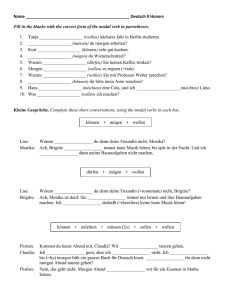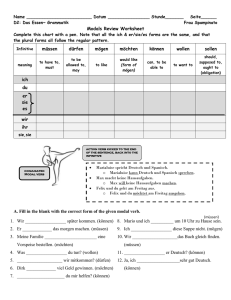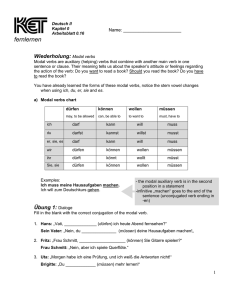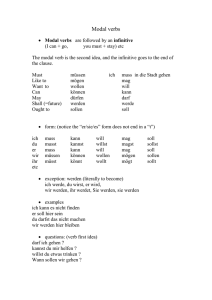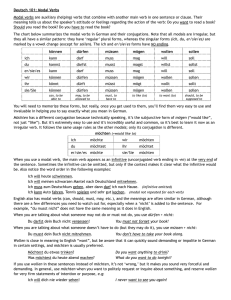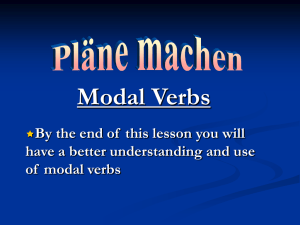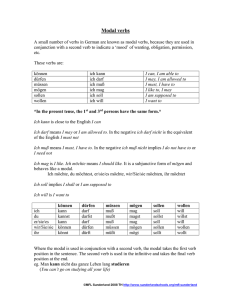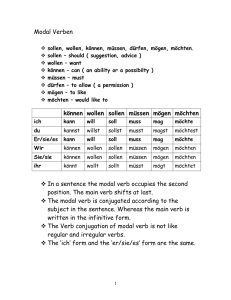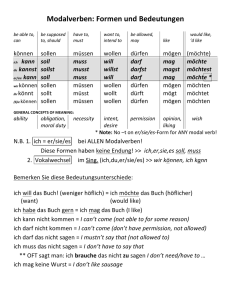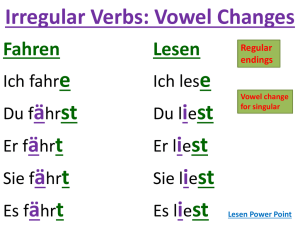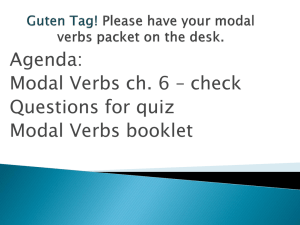Modalverben Modal verbs are auxiliary (helping) verbs that combine
Werbung
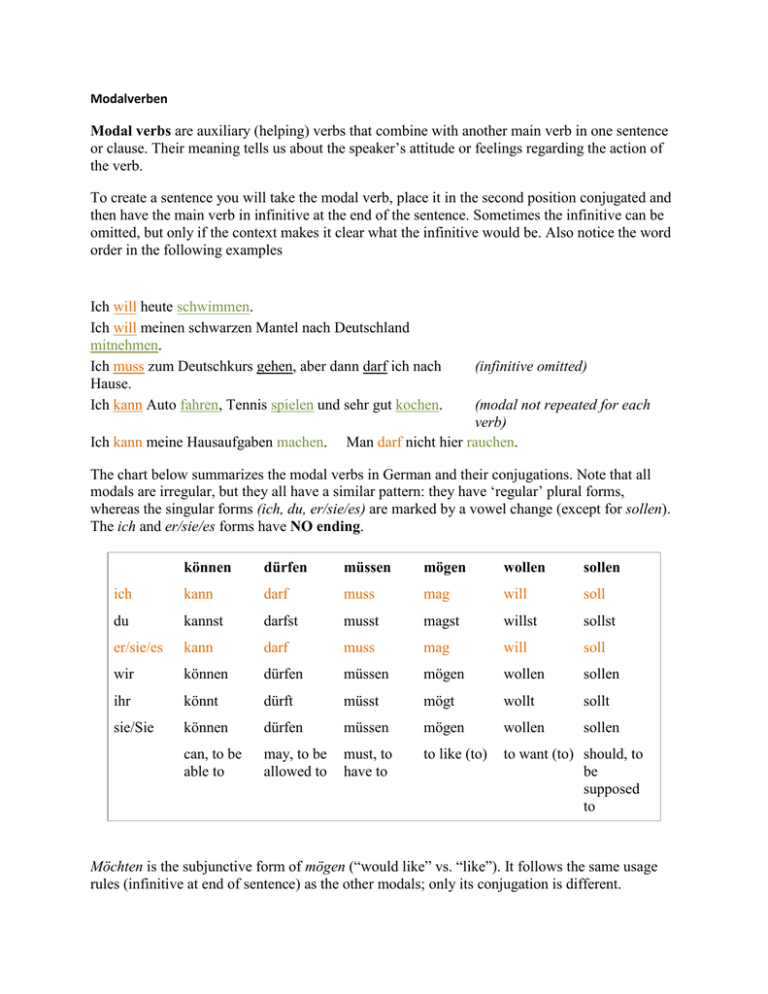
Modalverben Modal verbs are auxiliary (helping) verbs that combine with another main verb in one sentence or clause. Their meaning tells us about the speaker’s attitude or feelings regarding the action of the verb. To create a sentence you will take the modal verb, place it in the second position conjugated and then have the main verb in infinitive at the end of the sentence. Sometimes the infinitive can be omitted, but only if the context makes it clear what the infinitive would be. Also notice the word order in the following examples Ich will heute schwimmen. Ich will meinen schwarzen Mantel nach Deutschland mitnehmen. Ich muss zum Deutschkurs gehen, aber dann darf ich nach Hause. Ich kann Auto fahren, Tennis spielen und sehr gut kochen. Ich kann meine Hausaufgaben machen. (infinitive omitted) (modal not repeated for each verb) Man darf nicht hier rauchen. The chart below summarizes the modal verbs in German and their conjugations. Note that all modals are irregular, but they all have a similar pattern: they have ‘regular’ plural forms, whereas the singular forms (ich, du, er/sie/es) are marked by a vowel change (except for sollen). The ich and er/sie/es forms have NO ending. können dürfen müssen mögen wollen sollen ich kann darf muss mag will soll du kannst darfst musst magst willst sollst er/sie/es kann darf muss mag will soll wir können dürfen müssen mögen wollen sollen ihr könnt dürft müsst mögt wollt sollt sie/Sie können dürfen müssen mögen wollen sollen can, to be able to may, to be allowed to must, to have to to like (to) to want (to) should, to be supposed to Möchten is the subjunctive form of mögen (“would like” vs. “like”). It follows the same usage rules (infinitive at end of sentence) as the other modals; only its conjugation is different. möchten (=would like to) ich möchte wir möchten du möchtest ihr möchtet er/sie/es möchte sie/Sie möchten English also has modal verbs (can, should, must, may, etc.), and the meanings are often similar in German, although there are a few differences you need to watch out for, especially when a ‘nicht’ is added to the sentence. For example, “du musst nicht” does not have the same meaning as it does in English. When you are talking about what someone may not do or must not do, you use dürfen + nicht: Du darfst dein Buch nicht vergessen! You must not forget your book! When you are talking about what someone doesn’t have to do (but they may do it), you use müssen + nicht: Du musst dein Buch nicht mitnehmen. You don’t have to take your book along. Wollen is close in meaning to English “want”, but be aware that it can quickly sound demanding or impolite in German in certain settings, and möchten is usually preferred. In ordering food or requesting something to eat or drink, you will almost always use möchten, and when making plans with friends, möchten is also more common: Möchtest du etwas trinken? Do you want anything to drink? Was möchtest du heute abend machen? What do you want to do tonight? If you use wollen in these sentences instead of möchten, it’s not ‘wrong,’ but it makes you sound very forceful and demanding. In general, use möchten when you want to politely request or inquire about something, and reserve wollen for very firm statements of intention or purpose, e.g: Ich will dich nie wieder sehen! I never want to see you again! A. Lückensätze. Fill in the blanks with the correct form of the modal verb in parentheses. 1. 2. 3. 4. Tanja ___________________ (wollen) nächstes Jahr in Berlin studieren. ___________________ (müssen) du morgen arbeiten? Kurt ___________________ (können) sehr gut kochen. ___________________ (mögen) du Wienerschnitzel? 5. 6. 7. 8. 9. Warum ___________________ (dürfen) Sie keinen Kaffee trinken? Morgen ___________________ (sollen) es regnen (=rain). Warum ___________________ (wollen) Sie mit Professor Weber sprechen? ___________________ (können) ihr bitte mein Auto waschen? Hans ___________________ (möchten) ein Bier, und ich ___________________ (möchten) Rotwein. 10. Was ___________________ (sollen) ich machen? B. Mögen or möchten? Remember that mögen means “to like or enjoy”, while möchten translates as “would like”. Fill in the blanks so that the second sentence means approximately the same thing as the first. 1 . 2 . 3 . 4 . 5 . 6 . Willst du ein Stück Schokolade? = ___________________ du ein Stück Schokolade? Ich esse gern Schokolade. = Ich ___________________ Schokolade. Habt ihr eure neue Professorin gern? = ___________________ ihr eure neue Professorin? Was wollt ihr heute Abend essen? = Was ___________________ ihr heute Abend essen? = Mein Bruder ___________________ ein Fahrrad zum Geburtstag. = Ich ___________________ Mineralwasser mehr als Cola. Mein Bruder will ein Fahrrad zum Geburtstag. Ich trinke Mineralwasser lieber (=preferably) als Cola. C. Kleine Gespräche. Complete these short conversations, using the modal verbs in each box. können • mögen • wollen Lisa: Warum _________________ du denn deine Zimmerkollegin (=roommate) nicht, Monika? Monika: Ach, Brigitte _________________ immer laute Musik hören, bis spät in der Nacht. Und ich _________________ dann meine Hausaufgaben nicht machen. dürfen • Lisa: mögen • wollen Warum _________________ du denn deine Zimmerkollegin (=roommate) nicht, Brigitte? Brigitte: Ach, Monika ist doof. Sie _________________ immer nur lernen und ihre Hausaufgaben machen. Ich _________________ deshalb (=therefore) keine laute Musik hören! dürfen • können • • mögen sollen Karl: Warum kochst du denn dein tolles Chili con carne nicht, Bettina? Ich _________________ es so sehr! Bettina: Mein Chili con carne? Das nimmt zu viel Zeit. Aber du _________________ es gern selbst (=yourself) kochen. Karl: Ich? Ich _________________ gar nicht kochen! Bettina: Dann _________________ du es lernen, es ist nicht schwer! können • möchten • müssen (2x) • sollen • wollen Florian: Kommst du heute Abend mit, Claudia? Wir _________________ tanzen gehen. Claudia: Ich _________________ gern, aber ich _________________ nicht. Ich _________________ bis (=by) morgen früh ein ganzes Buch für Deutsch lesen. _________________ ihr denn nicht morgen Abend tanzen gehen? Florian: Nein, das geht nicht. Morgen Abend _________________ wir für ein Examen in Mathe lernen.
